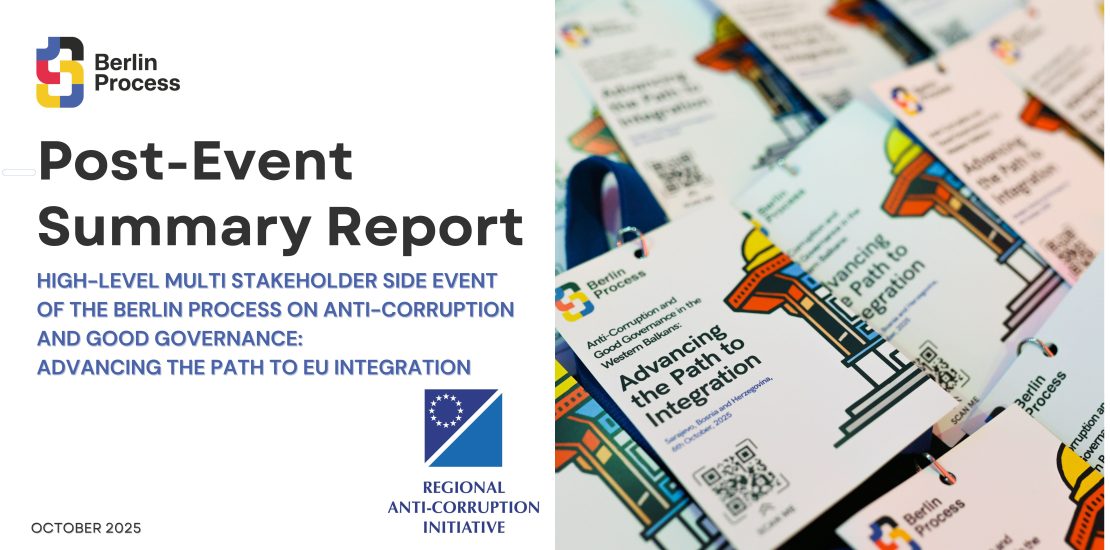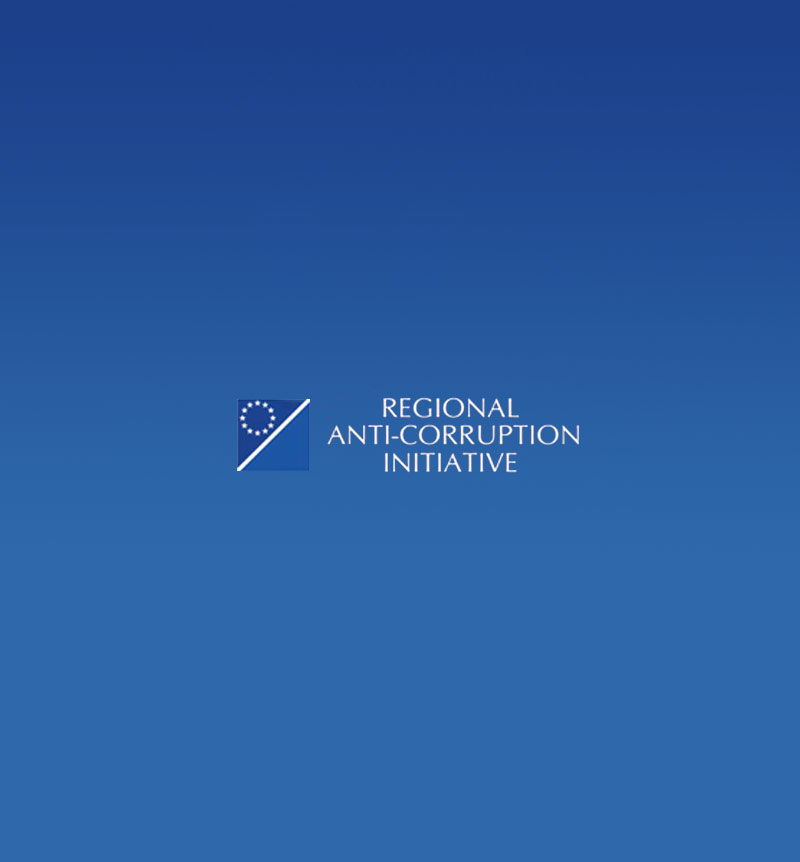- October 20, 2025
- Posted by: Vesna Latic
- Categories: RAI News, Uncategorized

The High-Level Multi-Stakeholder Side Event on Anti-Corruption and Good Governance, held on 6 October 2025 in Sarajevo, concluded with a united call to transform political commitments into concrete, measurable reforms across the Western Balkans.
Organized by the Regional Anti-Corruption Initiative (RAI) in partnership with HELVETAS Swiss Intercooperation and the European Union Police Assistance for BiH (EUPA4BiH), and supported by the AIRE Centre Western Balkans and the Austrian Development Agency (ADA), the event gathered over 120 participants from governments, civil society, international partners, and academia.
Key Conclusions: A Region United by Integrity
The discussions reaffirmed that anti-corruption is not only a governance challenge but a defining priority for stability, prosperity, and EU integration.
Participants agreed that integrity reforms must be built on regional ownership, inclusivity, and accountability.
Five main thematic conclusions emerged:
- Political Commitment and Regional Instruments:
- The Treaty on Exchange of Data for the Verification of Asset Declarations was endorsed as a milestone for transparency.
- The draft Regional Asset Sharing Agreement was acknowledged as the next vital step for cross-border recovery of illicit assets.
- Participants called for accelerated accession and implementation of both instruments, coupled with coordinated national follow-up plans.
- Institutional Reforms and Integrity Mechanisms:
- Speakers highlighted that integrity and ethics must be systematically embedded across justice, law enforcement, and public administration.
- The development of a Regional Integrity Index, to monitor national and local progress within the Berlin Process, was proposed.
- A recommendation was made to establish a regional task force under RAI coordination to oversee reforms and facilitate peer-learning.
- Gender equity and equal participation were emphasised as integral to resilient integrity systems.
- Monitoring, Accountability and Open Governance:
- The report stresses the need to institutionalise open data platforms, integrity indicators, and digital tools for evidence-based policymaking.
- Participants urged harmonisation of oversight approaches and real-time transparency to strengthen public trust.
- Corruption as a Driver of Instability and Migration:
- Corruption was identified as a root cause of institutional distrust and.
- Integrating anti-corruption measures into regional security, development, and migration strategies was recommended.
- Civil Society and Collective Action:
- Civil society, academia, journalists, and whistle-blowers were recognised as vital yet vulnerable actors.
- The report calls for institutionalised, rule-based platforms linking government, media, civil society, and the private sector, with legal safeguards against SLAPPs and pressure.
- Sustained funding and youth engagement were highlighted as essential for long-term reform.
Recommendations: Turning Integrity into a Regional Standard
All conclusions culminate in a concrete set of recommendations (to be submitted to the UK Government, host of the 2025 Berlin Process):
- Accelerate ratification and implementation of the Treaty on Exchange of Data and the Regional Asset Sharing Agreement.
- Align regional reforms with EU anti-corruption standards and enlargement conditionalities.
- Create a Regional Task Force under RAI coordination to oversee integrity reforms and the Regional Integrity Index.
- Advance digitalisation—e-procurement, transparency registers, open data portals—as key trust-building tools.
- Promote gender equity and inclusion to ensure reforms serve all members of society
- Institutionalise inclusive multi-stakeholder engagement, linking state, civil society, media, and private sector actors.
- Integrate youth and civic education initiatives into Berlin Process fora to nurture a culture of integrity.
Next Steps: Sustaining Momentum through the Berlin Process
According to the Closing Reflections (pages 21–22 of the report), follow-up coordination will be led jointly by the RAI Secretariat and HELVETAS.
They will support participating governments in mainstreaming the event’s outcomes into national and regional strategies, and in initiating dialogues on treaty ratification.
The recommendations will be integrated into Berlin Process mechanisms—including the Business Forum, Civil Society Forum, and ministerial coordination formats—to guarantee political continuity and institutional anchoring.
Gender equality, youth participation, and open governance will remain cross-cutting priorities, reaffirming that integrity and accountability are the foundation for stability, prosperity, and the European future of the Western Balkans.
Detailed Report
For a comprehensive overview of discussions, statements, and full recommendations, please read the complete Post-Event Summary Report:
High-Level Multi-Stakeholder Side Event of the Berlin Process on Anti-Corruption and Good Governance: Advancing the Path to EU Integration.
Regional Momentum for Justice and Anti-Corruption: Western Balkans Leaders Unite in Sarajevo


